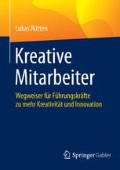Zusammenfassung
Dieses Kapitel veranschaulicht, welche kognitiven Aspekte Innovationsfähigkeit begünstigen. Nochmals wird die Rolle von Wissen und Expertise für Kreativität, Ideen und Innovation betont. Neben Fachwissen spielt prozedurales Wissen eine wichtige Rolle. Außerdem lernen Sie den Begriff „träges Wissen“ kennen und erfahren, dass sich dieses durch Kreativitätstrainings und betriebliche Lernmöglichkeiten vermeiden lässt. Besonders hervorgehoben wird die Trennung von Phasen divergenten Denkens und Phasen konvergenten Denkens bei betrieblichen Problemlöse- und Entscheidungsvorgängen.
Sie lernen darüber hinaus unterschiedliche kognitive Stile anhand ihrer Idealtypen kennen und können die Unterschiedlichkeit Ihrer Mitarbeiter in Sachen Kreativität und Innovation besser verstehen und einschätzen. Außerdem geht es am Ende dieses Kapitels um nichtkognitive Merkmale im Sinne von Persönlichkeitsmerkmalen, die ebenfalls das Können beeinflussen.
Access this chapter
Tax calculation will be finalised at checkout
Purchases are for personal use only
Weiterführende Literatur
Brown, T. (2009). Change by design. How design thinking transforms organizations and inspires innovation. New York: HarperCollins
Kilian, D., Krismer, R., Loreck, S., & Sagmeister, A. (2007). Wissensmanagement. Werkzeuge für Praktiker. Wien: Linde.
Proctor, T. (2010). Creative problem solving for managers. London: Routledge.
Puccio, G. J., Mance, M., & Murdock, M. C. (2011). Creative leadership. Skills that drive change. Los Angeles: Sage.
Literatur
Abele, A. E. (2004). Selbstregulationskompetenzen und beruflicher Erfolg. In B. Wiese (Hrsg.), Individuelle Steuerung beruflicher Entwicklung. Kernkompetenzen in der modernen Arbeitswelt (S. 61–89). Frankfurt a. M.: Campus.
Allport, G. W. (1937). Personality. A psychological interpretation. New York: Henry Holt.
Amabile, T. M. (1996). Creativity in context. Oxford: Westview Press.
Bandura, A. (1997). Self-efficacy. The exercise of control. New York: Freeman.
Barron, F., & Harrington, D. M. (1981). Creativity, intelligence and personality. Annual Review of Psychology, 32, 439–476.
Basadur, M., Graen, G. B., & Green, S. G. (1982). Training in creative problem solving: Effects on ideation and problem finding and solving in an industrial research organization. Organizational Behaviour and Human Performance, 30, 41–70.
De Jong, T., & Ferguson-Hessler, M. G. (1996). Types and qualities of knowledge. Educational Psychologist, 31(2), 105–113.
Ellwood, S., Pallier, G., Snyder, A., & Gallate, J. (2009). The incubation effect: Hatching a solution? Creativity Research Journal, 21(1), 6–14.
George, J. M., & Zhou, J. (2001). When openness to experience and conscientiousness are related to creative behavior: An international approach. Journal of Applied Psychology, 86(3), 513–524.
Gist, M., & Mitchell, T. (1992). Self-efficacy: A theoretical analysis of its determinants and malleabilty. Academy of Management Review, 17(2), 182–211.
Gruber, H., Mandl, H., & Renkl, A. (2000). Was lernen wir in Schule und Hochschule: Träges Wissen? In H. Mandl (Hrsg.), Die Kluft zwischen Wissen und Handeln. Empirische und theoretische Lösungsansätze (S. 139–156). Göttingen: Hogrefe.
Guilford, J. P. (1950). Creativity. American Psychologist, 5, 444–454.
Guilford, J. P. (1967). The nature of human intelligence. New York: McGraw-Hill.
Hayes, J. R. (1989). Cognitive processes in creativity. In J. A. Glover, R. R. Roning, & C. R. Reynolds (Hrsg.), Handbook of creativity (S. 135–145). New York: Plenum.
Jerusalem, M., Drössler, S., Kleine, D., Klein-Heßling, J., Mittag, W., & Röder, B. (2009). Förderung von Selbstwirksamkeit und Selbstbestimmung im Unterricht. Skalen zur Erfassung von Lehrer- und Schülermerkmalen. Berlin: Humboldt-Universität.
Kirton, M. J. (1976). Adaptors and innovators: A description and measure. Journal of Applied Psychology, 61(5), 622–629.
Kirton, M. J. (1977). Manual of the Kirton Adaption-Innovation inventory. London: National Foundation for Educational Research.
Kozhevnikov, M. (2007). Cognitive styles in the context of modern psychology: Toward an integrated framework of cognitive style. Psychological Bulletin, 133(3), 464–481.
Kreativpromenade. (2014). Divergentes Denken und konvergentes Denken (Unveröffentlichtes Dokument). Aachen: Lukas Rütten und Lobsang Zelle GbR.
Luthans, F., Avolio, B., Avey, J., & Norman, S. (2007). Positive psychological capital: Measurement and relationship with performance and satisfaction. Personnel Psychology, 60, 541–572.
MacKinnon, D. W. (1967). Assessing creative persons. The Journal of Creative Behavior, 1(3), 291–304.
Mandl, H. (2000). Was lernen wir in Schule und Hochschule: Träges Wissen? 15. Dortmunder Sommersymposium der Chemiedidaktik (S. 6–11). Dortmund: Universität Dortmund.
Mandl, H. (2011). Wissensnutzung als verkanntes Problem. Grundannahmen und Instruktionsansätze. News & Science, 27(1), 4–5.
McFadzean, E. (2000). Techniques to enhance creative thinking. Team Performance Management, 6(3), 62–72.
North, K. (2011). Wissensorientierte Unternehmensführung. Wertschöpfung durch Wissen. Wiesbaden: Gabler.
Patterson, F. (1999). Innovation potential predictor. Oxford: Oxford Psychological Press.
Pricken, M. (2010). Kribbeln im Kopf. Mainz: Herrmann Schmitz.
Probst, G., Raub, S., & Romhardt, K. (2006). Wissen managen. Wie Unternehmen ihre wertvollste Ressource optimal nutzen. Wiesbaden: Gabler.
Quinn, E. (1980). Creativity and cognitive complexity. Social Behavior and Personality, 8(2), 213–215.
Reis, J. (1996). Inventar zur Messung der Ambiguitätstoleranz. Heidelberg: Asanger.
Renkl, A. (1996). Träges Wissen: Wenn Erlerntes nicht genutzt wird. Psychologische Rundschau, 47, 78–92.
Rüegg-Stürm, J. (2003). Das neue St. Galler Management-Modell. Grundkategorien einer integrierten Managementlehre. Der HSG-Ansatz. Bern: Haupt.
Salanova, M., Bakker, A. B., & Llorens, S. (2006). Flow at work: Evidence for an upward spiral of personal and organizational resources. Journal of Happiness Studies, 7, 1–22.
Scott, G., Leritz, L. E., & Mumford, M. D. (2004). The effectiveness of creativity training: A quantitative review. Creativity Research Journal, 16(4), 361–388.
Wahl, D. (2002). Mit Training vom trägen Wissen zum kompetenten Handeln? Zeitschrift für Pädagogik, 48(2), 227–241.
Wang, C.-W., & Horng, R.-Y. (2002). The effects of creative problem solving training on creativity, cognitive type and R & D performance. R&D Management, 32(1), 35–45.
West, M. A. (1987). Role innovation in the world of work. British Journal of Social Psychology, 26(4), 305–315.
Witkin, H. A., Dyk, R. B., Faterson, H. F., Goodenough, D. R., & Karp, S. A. (1962). Psychological differentiation. Studies of development. New York: Wiley.
Author information
Authors and Affiliations
Corresponding author
Rights and permissions
Copyright information
© 2015 Springer-Verlag Berlin Heidelberg
About this chapter
Cite this chapter
Rütten, L. (2015). Können: Innovationsfähigkeit ausbauen. In: Kreative Mitarbeiter. Springer Gabler, Berlin, Heidelberg. https://doi.org/10.1007/978-3-662-46052-8_7
Download citation
DOI: https://doi.org/10.1007/978-3-662-46052-8_7
Published:
Publisher Name: Springer Gabler, Berlin, Heidelberg
Print ISBN: 978-3-662-46051-1
Online ISBN: 978-3-662-46052-8
eBook Packages: Business and Economics (German Language)

